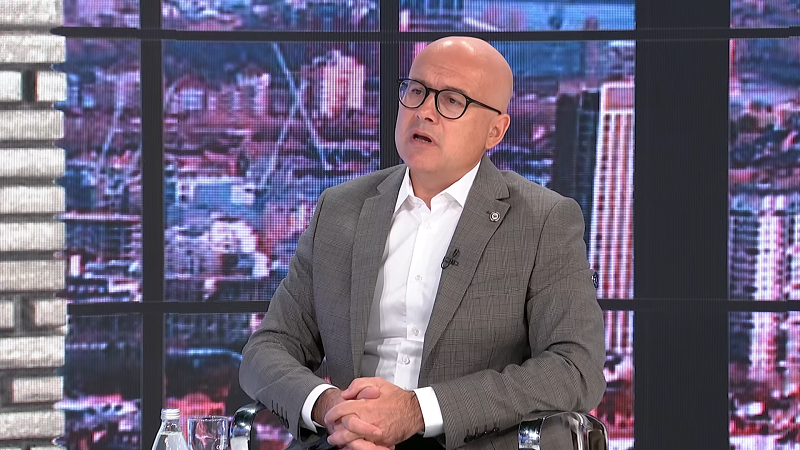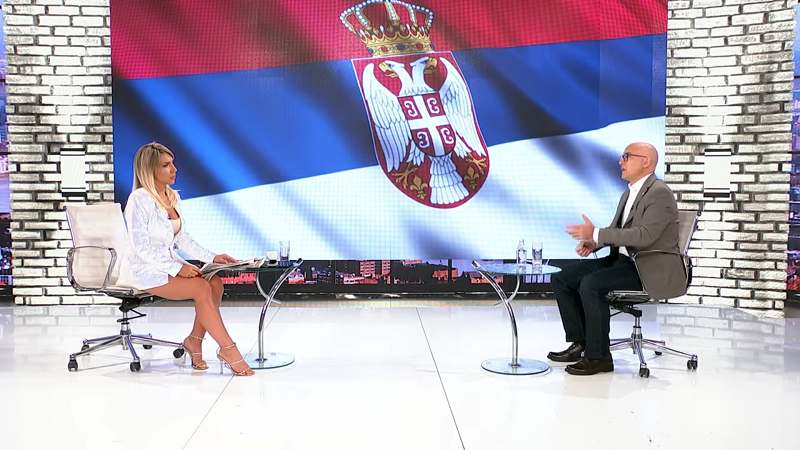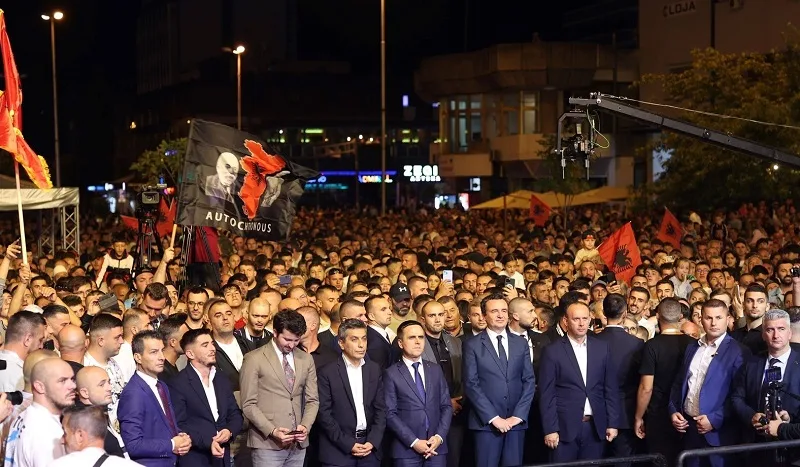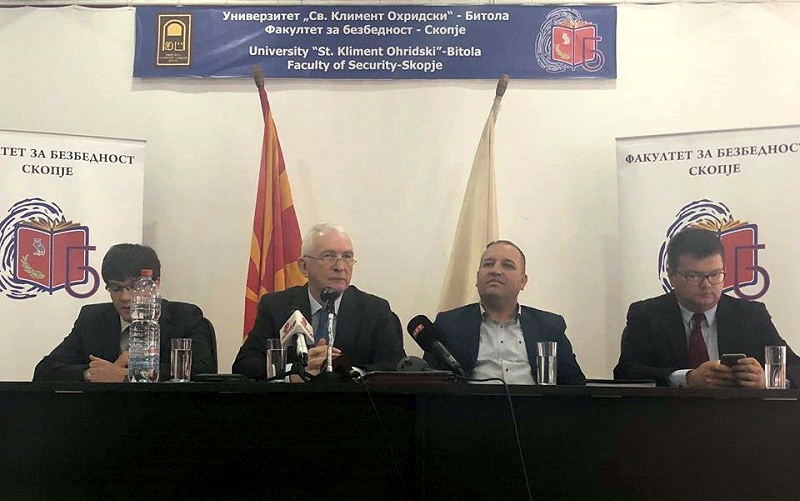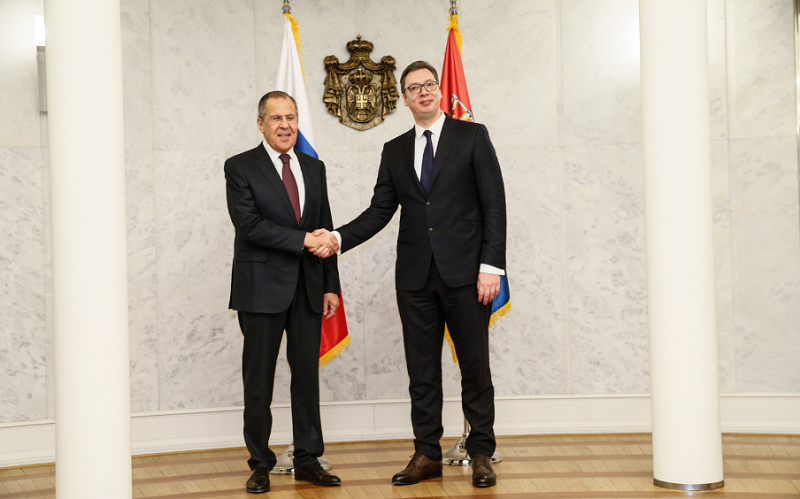- Just through the example of several statements made in August and July this year, especially if put in the context of the messages from Russian diplomats in 2018, one can see the connection between the propaganda narratives of Belgrade and Moscow. In all of them, one can clearly see the intention to introduce divisions and tensions, to stop or to make the European path of our country and the countries of theWestern Balkans difficult. The nationalist populism of Kurti and those similar to him is just an addition to the whole picture, but they are supporting actors.
- This text doesn’t deal with bots and trolls, but analyzes the propaganda narratives that come from the highest political echelons.
- If no one has woken up yet, they are free to continue sleeping.
By XHABIR DERALLA
Regardless of how much they may seem different, it should be clear that the “brotherly” statements of Serbian President Aleksandar Vucic and of his friend and protector, Serbian Defense Minister Milos Vucevic, are part of the same narrative. One with a stick, and the other with a “hug” are both building a narrative of a “brotherly connection” – as much against the Albanians, as much, if not more – against the West.
In the newest season of the Balkan propaganda melodrama (it was a bloody tragedy until not so long ago), the leading Serbian politicians promote “brotherhood” and “defensefrom the Albanians”, but also don’t forget to threaten with “Ukraine’s fate”. Behind all of this is a well-developed propaganda scheme that causes opening or maintaining of crisis situations and interference of as many as possible actors in the game.
Failure to recognize and expose these propaganda narratives will only deepen the crises and will cause new ones. It’s clear who will profit (Moscow and its allies in the Balkan and in Europe), and who will suffer losses (the democratic forces in the countries that are oriented towards the West).
Threats of a scenario “like in Ukraine” and clinking of weapons
“You made a mistake and it will come back to bite you, just like in Ukraine it came back to bite those who promoted Kosovo and Metohija as an independent state. You opened Pandora’s Box. Your bureaucratic responses that Kosovo is sui generis, that it is a special case are ridiculous. Neither Albin Kurti, nor Tirana believe you in that“, stated Minister Vucevic for Pink TV, which is under the control of the head of the state.
IT WILL COME BACK TO BITE YOU LIKE IN UKRAINESerbian Defense Minister Milos Vucevic in inciting rhetoric on TV Pink, 19 August 2023
Otherwise, Vucevic, as Vucic’s protégé, became the new president of the ruling Serbian Progressive Party, after this one, with all the melodrama, resigned from the party position in May, when tens of thousands of protestors demanded resignations. The resignation, of course, was yet another in the series of Vucic’s extremely manipulative political acrobatics. And now he is also calling for early parliamentary electionsthat he plans to win and continue his rule for another four years.

Towards the end of this interview on TV Pink, Vucevic openly threatened, saying that Kurti “listens to that bat“ of the Serbian army deployed under Kopaonik and several other locations on the border with Kosovo, which he, with unhidden sarcasm, numbered to the zealous television host, Jovana.
All Albanians with a project – Greater Albania. Are the Macedonians sleeping peacefully?
Defense Minister Vucevic, in the interview also said that it’s not only Kurti who is nurturing Greater Albanian ideas, but that all Albanians have the same goal and ambition – to create a Greater Albania. To put it most mildly, that is a dangerous narrative, with which he is labelling an entire nation as an enemy and implies hatred against every member of that nation.
Vucevic asked the Macedonians if they were sleeping peacefully. And then poured out a series of manipulative and anti-NATO messages.
“Are you sleeping peacefully? They think that they are in the NATO Alliance and that they have solved their problems. This is the mantra of both Montenegro and North Macedonia. When they became members of that collective security, that is, the NATO Alliance, they thought that they had solved all their problems and that nothing else could happen to them.”, Vucevic said among other things, disparaging the importance of NATO membership.
With 25% representation – the Albanians hold 50% of the government in Macedonia
Certainly, what kind of a politician would Vucevic be if he hadn’t referred to history, and so he called on the “poor” Macedonians and Montenegrins to see what’s in history, in order to understand what is happening in their own backyards. And like Serbia doesn’t interfere in the internal affairs of neighboring countries. But…!
“But we can conclude that 25 percent of Albanians have 50 percent of the power in North Macedonia. If it’s OK for the Macedonians, it’s also OK for us, just obviously you will have a policy that they will not see Macedonia as their own country”, Vucevic said.
ZELOUS television host Jovana on TV Pink gives Minister Vucevic room and catchwords, TV Pink 19/8/2023
And this is a dangerous narrative that encourages polarization and tensions, which is direct interference in the internal affairs of our country. Interesting is the similarity of this narrative with the propaganda of VMRO-DPMNE and Levica, which not once have said the same, in different contexts.
North Macedonia and Montenegro interfere in the internal affairs of Serbia, and not vice versa
Propaganda narratives often have the capacity to turn the story upside down and manipulate the facts. So does Vucevic. In his interview with TV Pink, he made several statements that are flagrant interference in the internal affairs of both countries. It can be seen from the threatening tone and disparagement in the context of the membership of the two countries in NATO, which then end with accusations in a totally different direction.
“They say we are interfering in the internal affairs. You are interfering in our internal affairs! You recognized Kosovo! Is there anything worse, more offensive and open interference in the internal affairs”, Vucevic said.
Let’s not forget, this is a defense minister and formal head of the ruling party. But of course, the Macedonians are not to be blamed. The Albanians hold 50% of the control there, right? Macedonian nationalists among experts and NGOs would add, for example, that the foreign affairs are created by an Albanian, whom they deny the right to negotiate on the Macedonian interests with Bulgaria. This, of course, is not an assumption, such – and much more radical – views have been promoted in public communication for years now.
Vucic praised Kovacevski
And in Athens, at the Balkan Summit that was organized by Greek Prime Minister Mitsotakis, on the occasion of the 20th anniversary of the Thessaloniki Declaration (when European and leaders of the Western Balkan countries agreed that the future of the region is in the EU), Vucic didn’t fail to stress that the Serbs and Macedonians are brotherly nations.
“Serbia and North Macedonia are truly friendly countries. If you ask me, brotherly. There are no misunderstandings between us and there must not be any. We do not ask for anything from our brothers, the only thing we offer is sincere friendship”, wrote Vucic on his notorious Instagram profile titled as buducnostsrbijeav (“The future of Serbia AV”, where AV are the initials of his name).
Vucic, in his address before cameras, strongly “praised” and “encouraged” the Macedonian Prime Minister for his “strong reaction against Albin Kurti”. And sent a message to Serbian politicians not to state something that could give room to those who want to make them the “same as Kurti”.

“I saw when Dimitar Kovacevski reacted very strongly to Albin Kurti over what he did in Tetovo. Very strongly, publically and openly. And I want to ask our officials, even when they don’t have the intentions, to be careful, to avoid saying anything that could be used by others, in order to make us the same as Kurti”, Vucic said, whose statements are often confusing, I would say obscure as well, but the messages are nevertheless clear enough. He stressed that Kovacevski, “spoke very, very harshly against Kurti, which surprised many”.

So, what’s the message here?
Do not, fellow Serbian politicians, criticize the Macedonians, they have problems with the Albanians. We’re not the same! Kurta is bad, and we are good. But the starting point of the narrative is: the orientation should not be NATO and the EU, but brotherly Russia. Macedonian media didn’t recognize the manipulation here, so they only conveyed news in which the patronizing position of the “great Serbian brother” can be felt.
GREATER ALBANIAKurti at a “private party” in Tetovo, where the flag of Greater Albania is waved and “Welcome to Albania” is sung (photo: Facebook profile of BESA leader Kasami)
Surely, solid material for this and such rhetoric of Vucic and of his partners was provided by the event with which Kurti these days became “famous” with the “private party”in Skopje and Tetovo, welcomed (on Macedonian soil!) with the song “Welcome to Albania” and with a flag with a map of Greater Albania.
Old, well-known Russian narratives
Using Ukraine as a threat isn’t a new narrative. Let’s go back a little.
Russian Ambassador Oleg Shcherbak, who in April 2018, ahead of the Referendumon accepting the Prespa Agreement, was invited to the Skopje Faculty of Security (!) to hold a lecture, said that there is propaganda with which Russia is portrayed as an aggressor. He also said that the countries of the Balkans are forced to make an artificial choice between the East and the West.
THE CONSEQUENCES ARE KNOWN TO UKRAINEThe Russian ambassador said that there is propaganda with which Russia is portrayed as an aggressor and the countries of the Balkans are forced to make an artificial choice between the East and the West. “The consequences from this are known to Ukraine, which was put under such an ultimatum that caused discord and civil war. Unfortunately, our Western partners have learned nothing from this”, said Shcherbak, Skopje, Faculty of Security, 2018
“The consequences of this are known to Ukraine, which was put under such an ultimatum that caused discord and civil war. Unfortunately, our Western partners have learned nothing from this… The Russian Federation cannot but be concerned about NATO’s military doctrine in which Russia is declared hostile. That is avery dangerous game and we wouldn’t want them to drag Macedonia into this adventure. For the Macedonian people to be used as cannon fodder and its territory as a NATO base”, said Shcherbak then. No one reacted. Well, I “honored” him with a gracious text”Shcherbak, GO HOME!“.
Someone might naively say that this comparison is a long shot, but it’s not. That narrative has been here for decades, and has particularly intensified since the first Russian aggression against Ukraine in 2014.
And Lavrov, in the middle of Belgrade, spread disinformation about the Tirana Platform
An illustration of Russian interference and identical narratives that Vucic and his protégés and partners promote is also the statement of Russian Foreign Minister Sergey Lavrov at the meeting with the Serbian President on February 21, 2018. At the briefing with journalists, the head of the Russian diplomacy revealed the “concern” of his country regarding the Macedonian political situation.
CONCERNED ABOUT MACEDONIA Lavrov and Vucic in Belgrade, 21February 2018
“Surely, we are concerned about the passiveness of the EU in regards to the initiative coming from Tirana in terms of the ‘Tirana Platform’, which is an explicit call for creating Greater Albania. There are enough examples that give us reason to be concerned. Recently, when parliamentary elections were held in Macedonia, the President of the Assembly, once elected to this position, entered the new office and put an Albanian flag on the desk. In Macedonia! – Lavrov said, in a shameless attempt to turn the conspiracy theory into a weapon of ultra-nationalist and anti-Western propaganda in North Macedonia.
At the same time, with this statement, he disclosed Moscow’s “concern” precisely in the period when Gruevski’s authoritarian regime was falling, which was followed by a series of ultranationalist and anti-Western protests that culminated with the bloody attack against the Parliament on April 27, 2017.
Serbian “defense” from the Albanians, through Vucic’s “great thoughts” (one month earlier)
The messages coming from “brotherly” Serbia, on the other hand, always have the element of “Serbian defense” from the Albanians. Hence, Vucevic’s messages are increasingly more or less the same messages as the ones of Vucic, on the same television, on July 14.The occasion for him being a guest on television was his friend, Aleksandar Vulin, head of the BIA, who ended up on the US blacklist, among else for participating in transnational organized crime and for providing Russia with a “platform for further, malign influence on the region”.
Then too, Vucic ”defended” the Macedonians from the Albanians.
“When the Macedonians embarked on arresting terrorists who killed 75 of their policemen, then you said ‘hey, stop, don’t arrest them, why are you arresting them?’. Now, you have nicely adopted a law on pardoning, for you, president, to personally pardon so and so, now you will make peace, peace, peace – nobody is to be blamed. Nobody cares about the fact that so many policemen were killed. An Albanian has to be president of the assembly or the government, the minister of foreign affairs has to be an Albanian, the official language has to be Albanian along with Macedonian. And that is possible!?”, said Vucic excitedly in “his” media nest, TV Pink.
One can simply be moved. The Americans “blackened” his partner, and he doesn’t stop caring about the Macedonians.
To stop or at least make the Euro-Atlantic path of North Macedonia more difficult
One cannot overlook the fact that the propaganda narratives that we are talking about here come from the highest political echelons in the mentioned and unmentioned centers of power.
Through the examples of these several statements made in August and July this year, compared to the messages of Russian diplomats in 2018, one can see the connection between the propaganda narratives of Belgrade and Moscow. The intention to introduce division and tensions can be noted in all of them. The ultimate goal of these narratives is to stop or at least make the Euro-Atlantic path of North Macedonia more difficult. The “defense” from the Albanians and the “fate” of Ukraine are just part of these narratives.
And all those, without leaving out Albin Kurti’s nationalist populism, “on the other side” (which, defends the Albanians from the “Serbian threat”) are not at all “interfering” in the internal affairs of our country.
On the contrary, just as the Serbian Defense Minister said, North Macedonia and Montenegro are “offensively” and “openly” interfering in the internal affairs of Serbia, by recognizing Kosovo. Just as Bulgaria is not the one that is denying the existence of an entire nation, but that this nation, the Macedonian, is the “attacker” of the Bulgarian identity and statehood. Russia “is not the aggressor”, but Ukraine and NATO are, which “threaten” Russia, while at the same time Ukraine is Nazi and does not exist (at the same time).
If no one has woken up…
Let’s conclude. Just through the example of several statements made in August and July this year, especially if put in the context of the messages from Russian diplomats in 2018, one can see the connection between the propaganda narratives of Belgrade and Moscow. In all of them, one can clearly see the intention to introduce divisions and tensions, to stop or to make the European path of our country and the countries of the Western Balkans difficult. The nationalist populism of Kurti and those similar to him is just an addition to the whole picture, but they are supporting actors.
This text doesn’t deal with bots and trolls, but analyzes the propaganda narratives that come from the highest political echelons. If no one has woken up yet, they are free to continue sleeping.
Propaganda narratives are simple and obvious, they sound like horror stories for children, but cause serious consequences for adults. Who, on the other hand, get mad when you address them as small children.
Translated by: N. Cvetkovska


